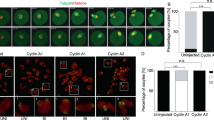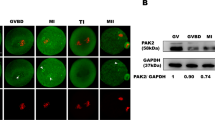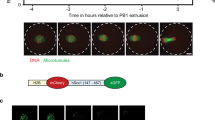Abstract
In a wide variety of animal species, oocyte maturation is arrested temporarily at prophase of meiosis I (ref. 1). Resumption of meiosis requires activation of cyclin-dependent kinase-1 (CDK1, p34cdc2), one component of maturation-promoting factor (MPF)2,3. The dual specificity phosphatases Cdc25a, Cdc25b and Cdc25c are activators of cyclin-dependent kinases4,5,6,7,8; consequently, they are postulated to regulate cell-cycle progression in meiosis and mitosis as well as the DNA-damage response9,10,11,12. We generated Cdc25b-deficient (Cdc25b−/−) mice and found that they are viable. As compared with wildtype cells, fibroblasts from Cdc25b−/− mice grew vigorously in culture and arrested normally in response to DNA damage. Female Cdc25b−/− mice were sterile, and Cdc25b−/− oocytes remained arrested at prophase with low MPF activity. Microinjection of wildtype Cdc25b mRNA into Cdc25b−/− oocytes caused activation of MPF and resumption of meiosis. Thus, Cdc25b−/− female mice are sterile because of permanent meiotic arrest resulting from the inability to activate MPF. Cdc25b is therefore essential for meiotic resumption in female mice. Mice lacking Cdc25b provide the first genetic model for studying the mechanisms regulating prophase arrest in vertebrates.
This is a preview of subscription content, access via your institution
Access options
Subscribe to this journal
Receive 12 print issues and online access
$209.00 per year
only $17.42 per issue
Buy this article
- Purchase on Springer Link
- Instant access to full article PDF
Prices may be subject to local taxes which are calculated during checkout



Similar content being viewed by others
References
Masui, Y. & Clarke, H.J. Oocyte maturation. Int. Rev. Cytol. 57, 185–282 (1979).
Gautier, J., Norbury, C., Lohka, M., Nurse, P. & Maller, J. Purified maturation-promoting factor contains the product of a Xenopus homolog of the fission yeast cell cycle control gene cdc2+. Cell 54, 433–439 (1988).
Dunphy, W.G., Brizuela, L., Beach, D. & Newport, J. The Xenopus cdc2 protein is a component of MPF, a cytoplasmic regulator of mitosis. Cell 54, 423–431 (1988).
Sadhu, K., Reed, S.I., Richardson, H. & Russell, P. Human homolog of fission yeast cdc25 mitotic inducer is predominantly expressed in G2. Proc. Natl Acad. Sci. USA 87, 5139–5143 (1990).
Nagata, A., Igarashi, M., Jinno, S., Suto, K. & Okayama, H. An additional homolog of the fission yeast cdc25+ gene occurs in humans and is highly expressed in some cancer cells. New Biol. 3, 959–968 (1991).
Galaktionov, K. & Beach, D. Specific activation of cdc25 tyrosine phosphatases by B-type cyclins: evidence for multiple roles of mitotic cyclins. Cell 67, 1181–1194 (1991).
Kakizuka, A. et al. A mouse cdc25 homolog is differentially and developmentally expressed. Genes Dev. 6, 578–590 (1992).
Sebastian, B., Kakizuka, A. & Hunter, T. Cdc25M2 activation of cyclin-dependent kinases by dephosphorylation of threonine-14 and tyrosine-15. Proc. Natl Acad. Sci. USA 90, 3521–3524 (1993).
Jessus, C. & Ozon, R. Function and regulation of cdc25 protein phosphate through mitosis and meiosis. Prog. Cell Cycle Res. 1, 215–228 (1995).
Nurse, P. Checkpoint pathways come of age. Cell 91, 865–867 (1997).
Weinert, T. A DNA damage checkpoint meets the cell cycle engine. Science 277, 1450–1451 (1997).
Draetta, G. & Eckstein, J. Cdc25 protein phosphatases in cell proliferation. Biochim. Biophys. Acta 1332, M53–63 (1997).
Tessarollo, L., Vogel, K.S., Palko, M.E., Reid, S.W. & Parada, L.F. Targeted mutation in the neurotrophin-3 gene results in loss of muscle sensory neurons. Proc. Natl Acad. Sci. USA 91, 11844–11848 (1994).
Wickramasinghe, D., Ebert, K.M. & Albertini, D.F. Meiotic competence acquisition is associated with the appearance of M-phase characteristics in growing mouse oocytes. Dev. Biol. 143, 162–172 (1991).
Wickramasinghe, D. et al. Two CDC25 homologues are differentially expressed during mouse development. Development 121, 2047–2056 (1995).
Nargi, J.L. & Woodford-Thomas, T.A. Cloning and characterization of a cdc25 phosphatase from mouse lymphocytes. Immunogenet. 39, 99–108 (1994).
Wu, S. & Wolgemuth, D.J. The distinct and developmentally regulated patterns of expression of members of the mouse Cdc25 gene family suggest differential functions during gametogenesis. Dev. Biol. 170, 195–206 (1995).
Mitra, J. & Schultz, R.M. Regulation of the acquisition of meiotic competence in the mouse: changes in the subcellular localization of cdc2, cyclin B1, cdc25c and wee1, and in the concentration of these proteins and their transcripts. J. Cell Sci. 109, 2407–2415 (1996).
Gould, K.L. & Nurse, P. Tyrosine phosphorylation of the fission yeast cdc2+ protein kinase regulates entry into mitosis. Nature 342, 39–45 (1989).
Kumagai, A. & Dunphy, W.G. The cdc25 protein controls tyrosine dephosphorylation of the cdc2 protein in a cell-free system. Cell 64, 903–914 (1991).
Dunphy, W.G. & Kumagai, A. The cdc25 protein contains an intrinsic phosphatase activity. Cell 67, 189–196 (1991).
Strausfeld, U. et al. Dephosphorylation and activation of a p34cdc2/cyclin B complex in vitro by human CDC25 protein. Nature 351, 242–245 (1991).
Gautier, J., Solomon, M.J., Booher, R.N., Bazan, J.F. & Kirschner, M.W. cdc25 is a specific tyrosine phosphatase that directly activates p34cdc2. Cell 67, 197–211 (1991).
Chen, M.S., Hurov, J., White, L.S., Woodford-Thomas, T. & Piwnica-Worms, H. Absence of apparent phenotype in mice lacking Cdc25c protein phosphatase. Mol. Cell. Biol. 21, 3853–3861 (2001).
Gopalan, G., Chan, C.S. & Donovan, P.J. A novel mammalian, mitotic spindle-associated kinase is related to yeast and fly chromosome segregation regulators. J. Cell Biol. 138, 643–656 (1997).
Svoboda, P., Stein, P., Hayashi, H. & Schultz, R.M. Selective reduction of dormant maternal mRNAs in mouse oocytes by RNA interference. Development 127, 4147–4156 (2000).
Acknowledgements
We thank M. Hilton, B. Eagleson, C. Palancar and S. Reid for chimera production and animal husbandry; T. Copeland for production of the polyclonal N-terminal Cdc25b antibody; T. Hunter and B. Sebastian for the gift of the full-length Cdc25b cDNA clone and J. McCormick for help with flow cytometry. We are also indebted to L. Lock, J. Kervinen, A. Golden, I. Daar, G. Gopalan, L. Siracusa, M. Parsons, V. Coppola and K. Vousden for helpful discussions and critical reading of the manuscript; M. Wilson for help with manuscript preparation; and R. Frederickson for preparation of one of the figures. This work was supported in part by the National Cancer Institute, National Institutes of Health, under contract with ABL (P.J.D. and L.T.), by grants from the National Institute of Child Health and Human Development (to P.J.D. and R.M.S.), by a National Research Service Award from the National Cancer Institute (to A.J.L.) and by a National Cancer Institute Cancer Center Core Grant to the Kimmel Cancer Center.
Author information
Authors and Affiliations
Corresponding author
Rights and permissions
About this article
Cite this article
Lincoln, A., Wickramasinghe, D., Stein, P. et al. Cdc25b phosphatase is required for resumption of meiosis during oocyte maturation. Nat Genet 30, 446–449 (2002). https://doi.org/10.1038/ng856
Received:
Accepted:
Published:
Issue Date:
DOI: https://doi.org/10.1038/ng856
This article is cited by
-
The molecular regulatory mechanisms of meiotic arrest and resumption in Oocyte development and maturation
Reproductive Biology and Endocrinology (2023)
-
Signaling mechanisms and their regulation during in vivo or in vitro maturation of mammalian oocytes
Reproductive Biology and Endocrinology (2022)
-
Heat Shock Procedure Affects Cell Division-Associated Genes in Gynogenetic Manipulation
Marine Biotechnology (2022)
-
Genome-wide DNA methylation dynamics during epigenetic reprogramming in the porcine germline
Clinical Epigenetics (2021)
-
The CRL4-DCAF13 ubiquitin E3 ligase supports oocyte meiotic resumption by targeting PTEN degradation
Cellular and Molecular Life Sciences (2020)



